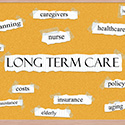
 Getting out of bed, getting dressed, feeding, and bathing … they are all simple acts that can become daunting, even impossible for millions of Americans struggling with Alzheimer’s disease and other dementias. As the population of those 65 and older continues to expand, so do the dementia rates.
Getting out of bed, getting dressed, feeding, and bathing … they are all simple acts that can become daunting, even impossible for millions of Americans struggling with Alzheimer’s disease and other dementias. As the population of those 65 and older continues to expand, so do the dementia rates.
According to the Alzheimer’s Association’s 2014 report, by 2050 half of the population 65 and older could have Alzheimer’s disease. The current statistics aren’t quite so startling, but they do shed light on the scope of the issue:
- One in nine people age 65 and older (11%) has Alzheimer’s disease
- About one-third of people 85 and older (32%) have Alzheimer’s disease
- Alzheimer’s disease is officially listed as the sixth-leading cause of death in the United States
Alzheimer’s disease takes a heavy toll on women in two significant ways. First, almost two-thirds of Alzheimer’s cases in the country are women. The report attributes this to women living longer, on average, than men, and older age being the greatest risk factor for Alzheimer’s. Also, the burden of caring for someone with Alzheimer’s disease often falls on women. These unpaid caregivers are often immediate family members, but can be relatives or friends.
In 2013, these individuals provided an estimated 17.7 billion hours of informal (that is, unpaid) care, a contribution to the nation valued at over $220.2 billion. This is approximately half of the net value of Wal-Mart sales in 2012 ($443.9 billion) and nearly eight times the total revenue of McDonald’s in 2012 ($27.6 billion).” -Alzheimer’s Association 2014 report
Given the statistics, doesn’t it make sense to plan ahead for the possibility that your family might be affected? The time is now to make sure that you have all of the important pieces of a plan in place:
- Make sure that there is a plan for financing future long term care costs
- Make sure all appropriate legal documents are in place
- Make sure that your family has discussed and intentionally planned for the kind of care and living arrangements that are preferred
- Make sure that you know and understand the resources that might be available
If your family doesn’t have those 4 bases covered, contact your financial planner to schedule a family meeting to discuss these and other important issues.
Sandra Adams, CFP® is a Partner and Financial Planner at Center for Financial Planning, Inc. Sandy specializes in Elder Care Financial Planning and is a frequent speaker on related topics. In 2012-2014 Sandy has been named to the Five Star Wealth Managers list in Detroit Hour magazine. In addition to her frequent contributions to Money Centered, she is regularly quoted in national media publications such as The Wall Street Journal, Research Magazine and Journal of Financial Planning.
Five Star Award is based on advisor being credentialed as an investment advisory representative (IAR), a FINRA registered representative, a CPA or a licensed attorney, including education and professional designations, actively employed in the industry for five years, favorable regulatory and complaint history review, fulfillment of firm review based on internal firm standards, accepting new clients, one- and five-year client retention rates, non-institutional discretionary and/or non-discretionary client assets administered, number of client households served.
The information has been obtained from sources considered to be reliable, but we do not guarantee that the foregoing material is accurate or complete. C14-013764